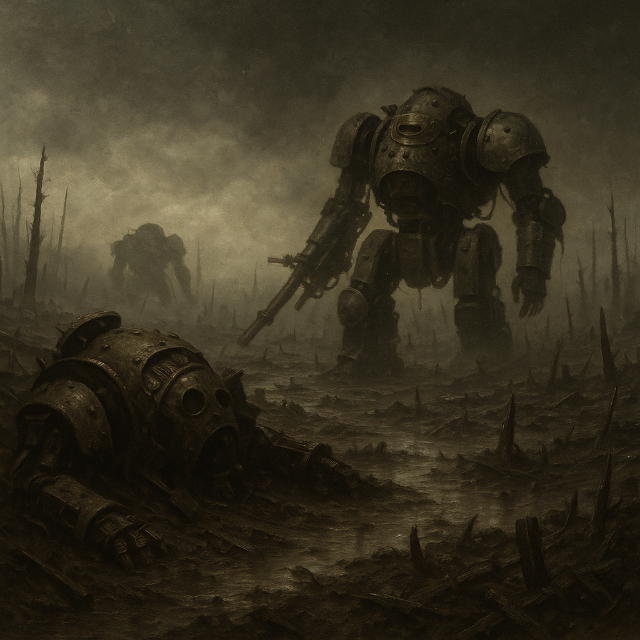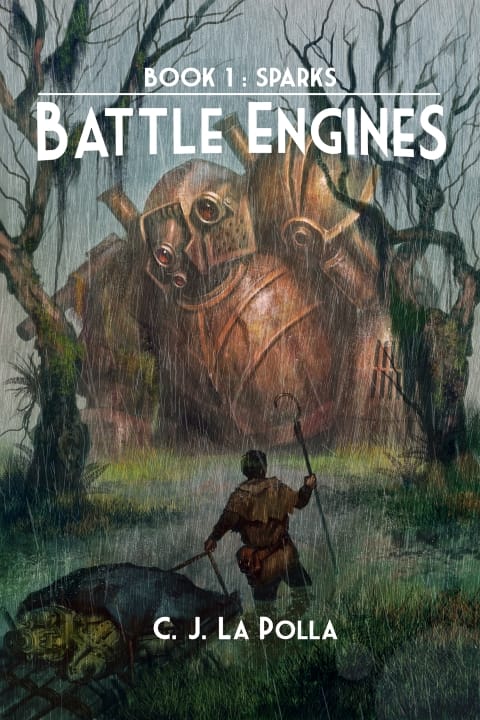Echoes of the Great War

The smoke may have cleared, but the world still trembles.
Ten years have passed since the cannons fell silent across Tarn, since the last Engine sank into the mire and the sky ceased to burn. We call it peace, though it feels more like a long breath drawn between storms.
When the Great War ended, every nation signed their names in ink and ash. The ink for the treaties. The ash for the dead. And beneath the frozen soil of Gwynn, Dioia, and all the fractured realms in between, the bones of men lie tangled with the skeletons of their creations. The earth has not yet decided which deserves remembrance.
The Machines That Remember
They say the fields still whisper. That if you walk the old battlefronts in the hour before dawn, you can hear the low hum of dormant engines. Perhaps it is wind through steel ribs, or perhaps it is something deeper — the ghosts of a thousand machines dreaming of the war that gave them purpose.
The Viper V-52s, the Aurochs siege walkers, the Flash scouts, the Ironclads and Scorpions — all of them were more than weapons. They were identities, national pride molded into armor plates and rivets. When the war ended, the soldiers went home broken, but the machines remained where they fell. Their hulks became monuments, their names whispered like old prayers.
And now, a new generation grows up among their rusting shells, children playing in the shadows of titans they will never understand.
The Cost of Progress
The war was meant to end chaos. Instead, it mechanized it. Every victory demanded a greater invention, every invention a greater atrocity.
In the final years, factories in Gwynn glowed day and night — red suns that never set. The engineers called it advancement. The soldiers called it damnation. For each new Battle Engine that rolled from the foundries, a little more of Tarn’s soul was sold for the promise of superiority.
When peace came, it did not arrive with celebration. It came with the hiss of extinguished furnaces, the silence of machines denied purpose.
We had built gods of steel and asked them to bleed for us. When the bleeding stopped, we realized we had forgotten how to live without their noise.
Cold Peace
Today, Tarn sits in what historians call a cold peace.
The borders remain tense, the air thick with unspoken grudges. Dioia’s cities are rebuilt, but their spires lean like weary soldiers. Gwynn’s factories churn again, though they swear the engines they build now are for industry, not war.
No one believes that.
The scars are too deep, the distrust too strong. In every capital, old generals whisper to new politicians about unfinished business. And somewhere in the wastelands, scavengers unearth forgotten weapons, reawakening machines that were never meant to sleep.
The world is healing, but the wound never truly closed.
Voices of the Fallen
I once met a veteran who fought in the Ashen Pass, where a hundred Engines clashed for three days straight. His hands shook as he described it.
“The ground moved,” he said. “It wasn’t the shells. It was the weight of it all. The weight of what we became.”
He told me that by the third day, he could no longer tell the difference between machine and man. Both screamed when torn apart. Both burned when struck. The difference, he said, was that the machines didn’t stop.
He paused before finishing his drink and muttered, “I think they loved it more than we did.”
The Quiet After
A decade on, the veterans of the Great War have become relics themselves — reminders of a time too painful to honor and too defining to forget. The governments speak of unity, of progress, of rebuilding Tarn into something stronger. Yet the monuments rise faster than the bridges.
Each year, on the Day of Silence, the bells toll once for every regiment lost. The sound rolls across the plains like distant thunder. Some claim it is the earth mourning its children. Others say it is warning us that the silence cannot last forever.
What Comes Next
No one dares say it aloud, but everyone feels it: the next war has already begun — not in the trenches, but in the hearts of men who cannot let go of the engines that once made them powerful.
They call it peace. But peace built upon the wreckage of war is a fragile thing, easily shattered by ambition, memory, or pride.
And somewhere, beneath the ruins and rust, an old Viper’s engine still ticks once every hour — a heartbeat waiting to be heard again.
by C. J. LaPolla © 2025
Enter the fray! Click the image to pick up your copy of Battle Engines: Sparks today!
